Product-market fit is the crucial moment when your product perfectly meets a strong market demand. As venture capitalist Marc Andreessen famously said, "Product/market fit means being in a good market with a product that can satisfy that market." It’s not a one-time event but a continuous state where customer satisfaction fuels organic growth. Without it, businesses face high churn rates, expensive marketing campaigns, and frustratingly slow progress.
Achieving this state is the single most important milestone for any venture. To truly maximize its impact and drive sustained success, it's essential to understand and master a product-led growth strategy, which uses the product itself as the primary driver of customer acquisition, conversion, and expansion.
This article moves beyond theory to dissect real-world product market fit examples. We will analyze the specific strategies and pivots that transformed struggling startups into market leaders. For each of the 7 companies featured, we’ll explore the "before" (the struggle for traction), the "pivot" (the critical strategic shift), and the "after" (the resulting growth explosion). By understanding these patterns, you will gain actionable insights to find, measure, and scale product-market fit for your own business or creative project.
1. Creativize
Creativize represents a powerful example of achieving product-market fit by meticulously targeting an underserved, high-potential niche: local creative talent and the businesses that need them. Instead of competing with global freelance giants, Creativize carved out a defensible market by focusing on the unique value of local collaboration. This approach directly addresses the pain points of small to medium businesses (SMBs), startups, and marketing agencies that prioritize regional expertise, cultural alignment, and the potential for in-person synergy.
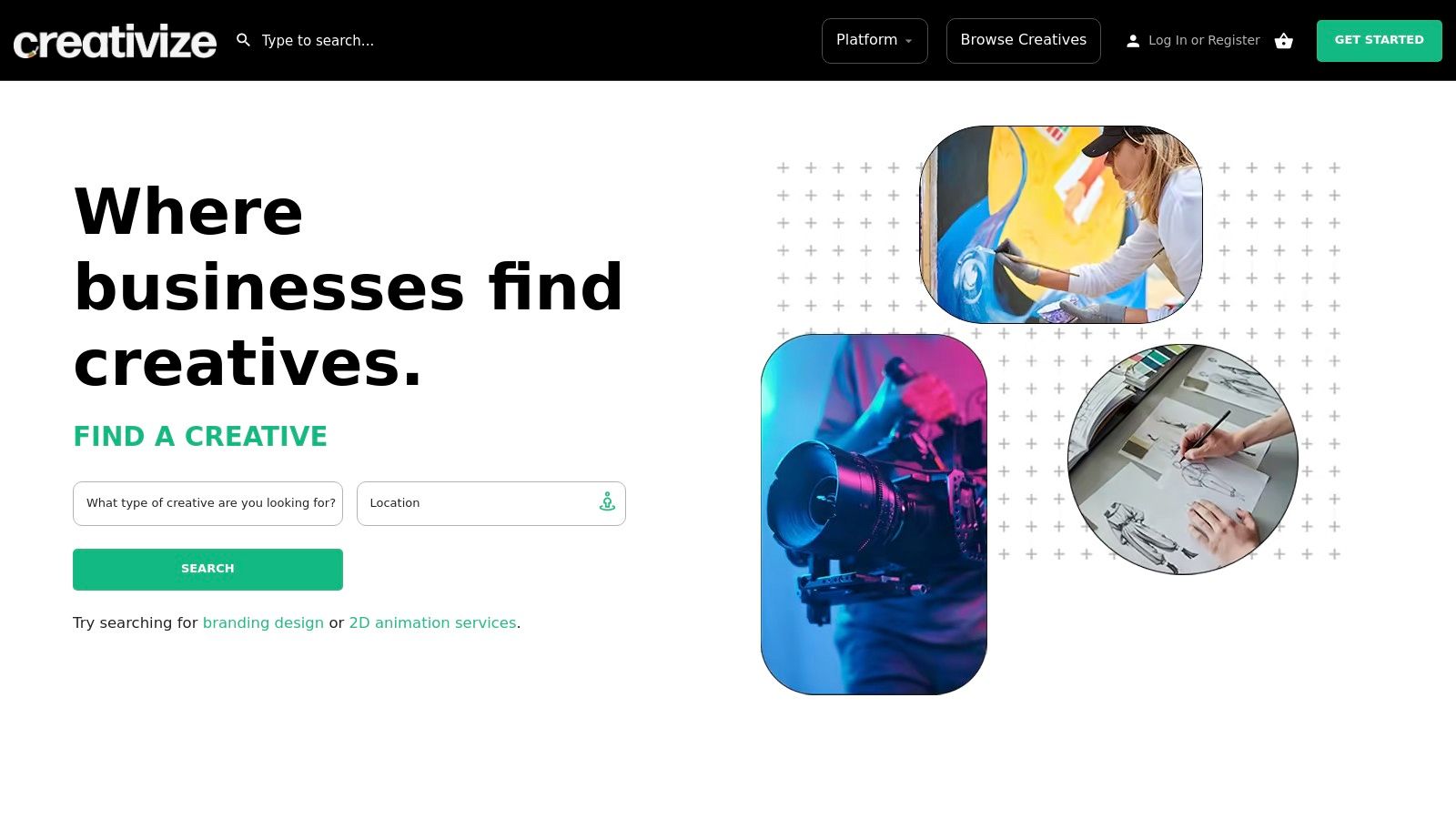
The platform’s success stems from a deep understanding of its two-sided market. For businesses, the friction of finding reliable, vetted local creatives is immense. Creativize solves this with an intuitive search function, detailed portfolios, and verified reviews, transforming a high-risk, time-consuming process into a streamlined, confident decision. For creatives, it provides direct access to a curated stream of local opportunities, helping them build sustainable careers within their own communities.
Strategic Analysis: The Hyper-Local Advantage
Creativize’s strategy is a masterclass in market segmentation. By concentrating on local and regional connections, it built a strong network effect where the value for both businesses and creatives increases as more local users join. This localization is not just a feature; it is the core of its value proposition.
Key Strategic Insight: True product-market fit often lies not in creating a new market, but in super-serving a valuable segment of an existing one. Creativize identified that for many businesses, "local" is a critical, unaddressed filter in the hiring process.
This focus allows the platform to offer benefits that larger, more generalized platforms cannot replicate effectively. It fosters a sense of community, facilitates easier collaboration, and ensures that the creative work is culturally and contextually relevant to the local market. This approach demonstrates one of the most compelling product market fit examples for SaaS platforms in the creative industry.
Actionable Takeaways for Founders
- Solve a Specific, High-Friction Problem: Don't try to be everything to everyone. Creativize honed in on the specific difficulty of sourcing local creative talent, a distinct challenge from just finding any freelancer. Identify a similar high-friction point in your industry.
- Build a Community, Not Just a Tool: The platform’s blog, success stories, and industry insights are not just content marketing. They are community-building tools that establish Creativize as a central hub, increasing user stickiness and organic growth.
- Leverage a Two-Sided Network: The platform is engineered to become more valuable as it grows. The more businesses that use it, the more attractive it becomes to top creatives, and vice versa. This creates a powerful, defensible moat.
Platform Breakdown
| Feature Analysis | Key Benefit |
|---|---|
| Intuitive Local Search | Drastically reduces the time and effort required for businesses to find relevant, nearby creative professionals. |
| Verified Reviews & Portfolios | Builds trust and transparency, allowing companies to hire with confidence and mitigate project risks. |
| Educational Content Hub | Positions the platform as an industry authority, fostering loyalty and providing continuous value beyond simple transactions. |
| Streamlined Hiring Process | Removes administrative bottlenecks, enabling faster project kick-offs and more efficient collaboration. |
While pricing details are not stated upfront, the platform emphasizes accessible connections, suggesting a model designed to lower the barrier to entry for its target audience of SMBs and local organizations. This strategic ambiguity may encourage users to sign up to learn more, driving lead generation.
For businesses seeking to infuse their projects with local flair or creatives aiming to build a strong regional client base, Creativize offers a focused, effective, and community-driven solution.
2. Coursera: "Establishing Product-Market Fit" Course
For entrepreneurs and product managers who prefer a structured learning path, Coursera's "Establishing Product-Market Fit" course offers a comprehensive, university-backed curriculum. Developed by the University of Maryland, this course provides the foundational knowledge needed to navigate the complexities of finding your market sweet spot, making it a powerful tool for achieving PMF rather than a direct example of it. It’s an educational resource designed to guide you through the process.
This beginner-level program is self-paced, allowing learners to fit the modules into their own schedules. The content systematically covers how to identify and understand target customers, define a compelling value proposition, and develop a minimum viable product (MVP). These elements are crucial first steps in any product's journey toward market validation.
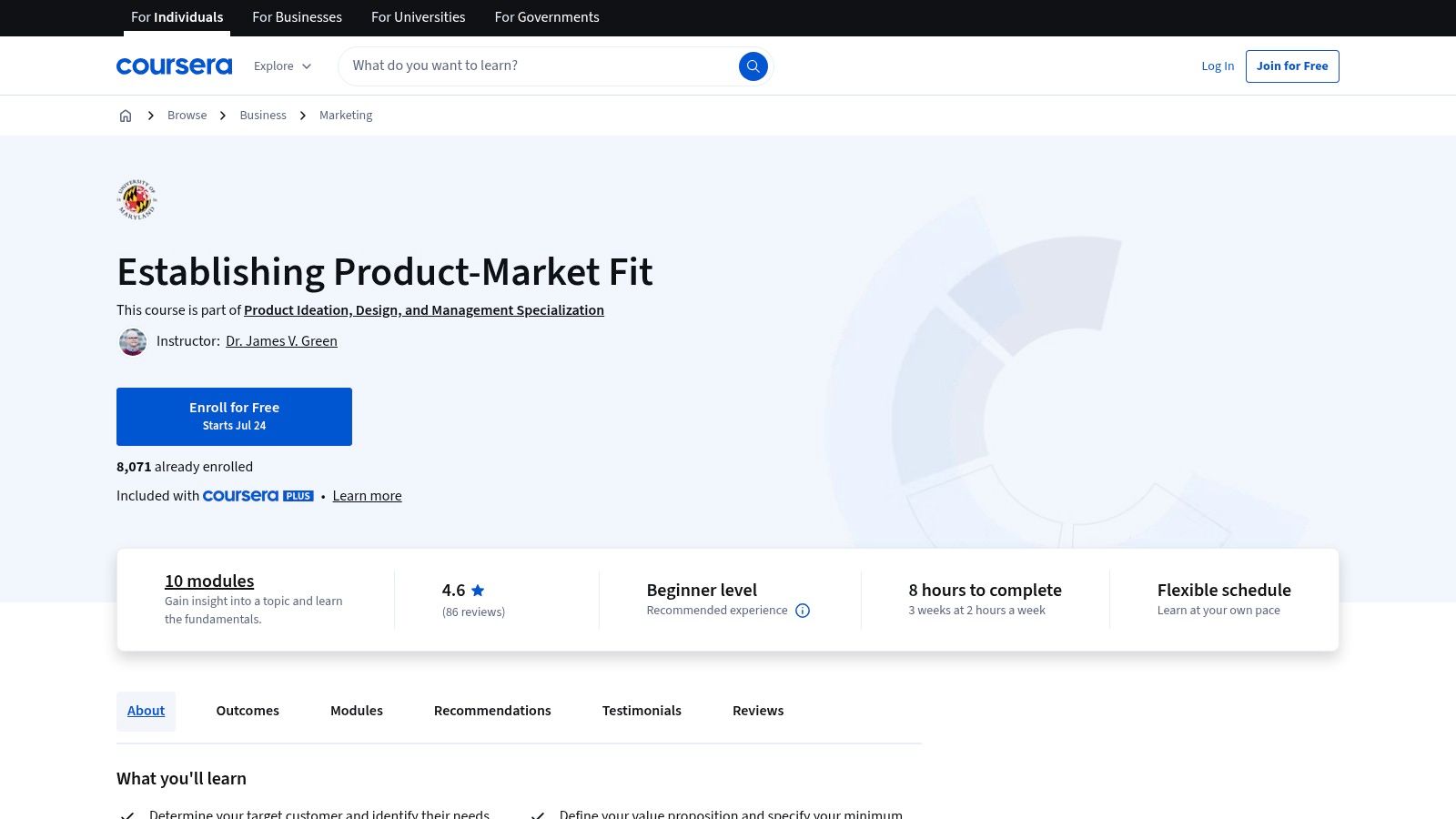
Strategic Analysis
The course itself demonstrates a form of product-market fit within the e-learning space. By partnering with a reputable institution like the University of Maryland, Coursera taps into a market segment that values credible, academically rigorous content over informal tutorials. This approach caters to professionals seeking verifiable skills.
The flexible, self-paced model directly addresses the pain point of busy professionals who cannot commit to fixed class schedules. Its focus on foundational concepts like the MVP framework is particularly valuable. For a deeper dive into practical applications, you can explore these minimum viable product examples to see the theory in action.
Key Features & Benefits
| Feature | Benefit |
|---|---|
| University-Backed Content | Provides credibility and assurance of high-quality, structured learning. |
| Flexible Schedule | Allows learners to progress at their own pace, fitting education around work. |
| Comprehensive Curriculum | Covers essential PMF topics from customer analysis to MVP creation. |
| Shareable Certificate | Offers a tangible credential to add to professional profiles upon paid completion. |
Access and Pricing
- Availability: The course is available globally on the Coursera platform.
- Access: Course materials are available to audit for free, which includes access to lectures and readings.
- Pricing: To receive a shareable certificate and access graded assignments, you must purchase the course, either as a standalone purchase or as part of a Coursera Plus subscription.
Website: Coursera.org
3. Product Manager Courses: "Product Market Fit Bootcamp"
For founders and product leaders in the B2B tech space seeking an intensive, hands-on learning experience, the "Product Market Fit Bootcamp" from Product Manager Courses offers a rigorous, structured path. This 8-week program is designed to move beyond theory, guiding participants to create actionable strategies for achieving product-market fit. Led by industry expert Anurag Wadehra, the bootcamp uses a proprietary Five Factors Framework to deconstruct the PMF process into manageable, practical steps.
This course is less of a passive learning tool and more of an active workshop. It demands a weekly commitment and is built around real-world case studies and hands-on exercises, making it one of the most practical educational product market fit examples available. The goal is for every participant to leave with a clear, market-ready plan.
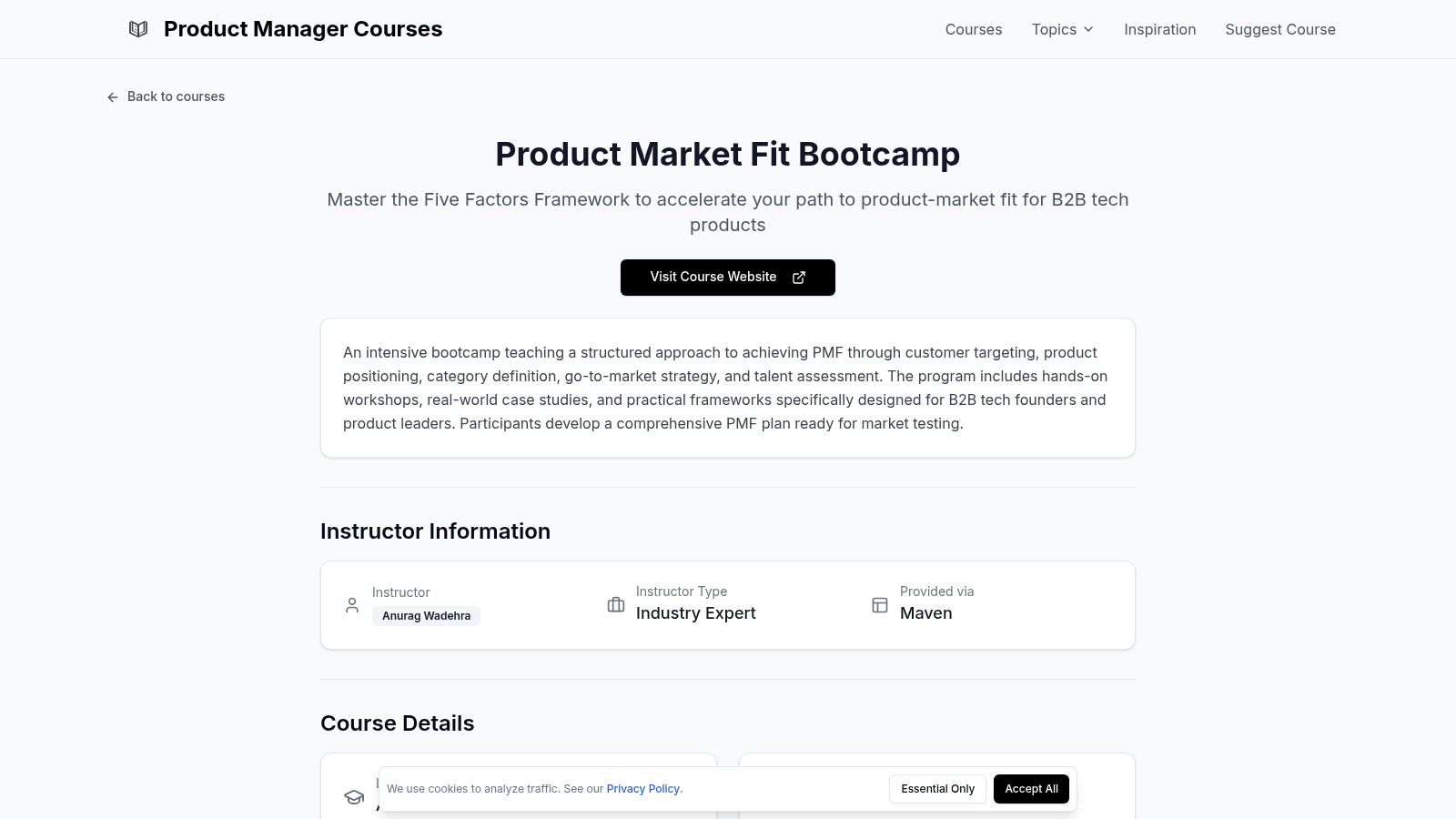
Strategic Analysis
This bootcamp achieves product-market fit by narrowly targeting a high-value niche: B2B tech founders and product leaders. Unlike broader courses, it directly addresses the specific challenges of enterprise sales cycles, complex stakeholder needs, and value-driven purchasing decisions. Its structured, time-bound format creates a sense of urgency and accountability, which is a major draw for motivated professionals looking for tangible results rather than just conceptual knowledge.
The program's core strength is its Five Factors Framework, which provides a replicable system for analyzing the market, value proposition, feature set, user experience, and business model. This framework transforms the often ambiguous goal of PMF into a clear, step-by-step process. By focusing on producing a concrete, testable plan, the course delivers immediate, practical value that justifies its premium price point.
Key Features & Benefits
| Feature | Benefit |
|---|---|
| Five Factors Framework | Provides a structured, systematic approach to analyzing and achieving PMF. |
| Hands-On Workshops | Ensures learning is practical and directly applicable to a participant's own product. |
| B2B Tech Focus | Delivers highly relevant insights tailored to the unique challenges of B2B markets. |
| Expert-Led Instruction | Offers direct access to guidance and feedback from an experienced industry professional. |
Access and Pricing
- Availability: The bootcamp is offered online with a fixed schedule and cohort-based structure.
- Access: Requires enrollment and is delivered through live weekly sessions and coursework.
- Pricing: The course is positioned as a premium offering, priced at $950 for the full 8-week program.
4. Product-Led Alliance: "Product-Market Fit Certified" Course
For professionals seeking a specialized, industry-focused certification, the Product-Led Alliance offers its "Product-Market Fit Certified" course. This program is tailored for product managers and marketers who want to master the entire PMF lifecycle, from initial identification to scaling and optimization. It stands out by providing practical templates and frameworks taught by experienced industry practitioners, making it an actionable resource for achieving product market fit rather than just a theoretical overview.
This self-paced course features over three hours of on-demand content spread across five modules. It covers how to define and measure PMF, validate hypotheses, and pivot when a product isn't resonating with its intended market. The inclusion of official certification provides a valuable credential for those looking to advance their careers in product-led roles.
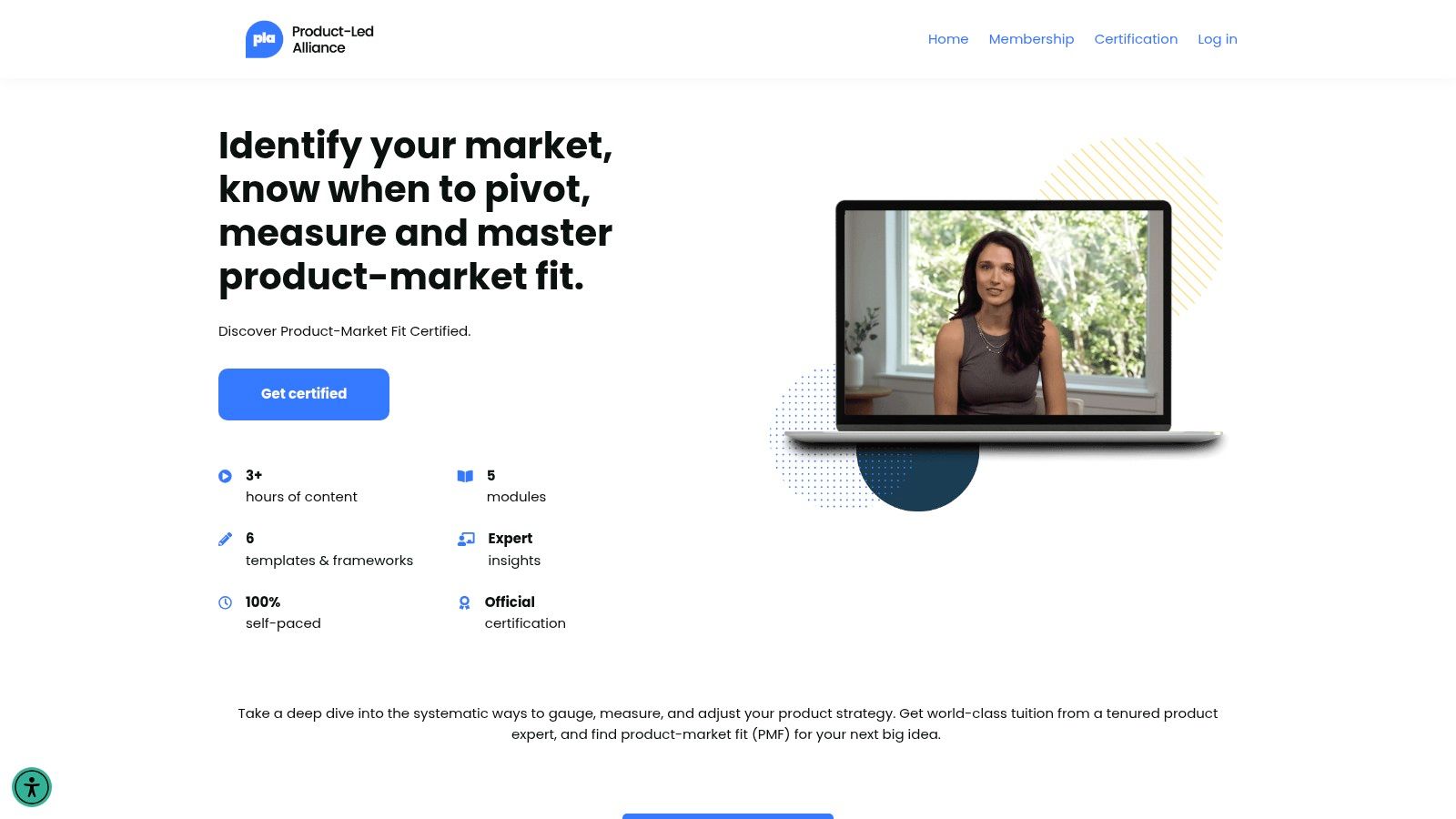
Strategic Analysis
The course itself has found product-market fit with a niche audience: ambitious product professionals who value peer-led, practical education over academic theory. By focusing on templates, frameworks, and expert insights, the Product-Led Alliance directly addresses the pain point of applying abstract concepts to real-world business scenarios. This hands-on approach is a key differentiator from more academic programs.
Its certification model caters to a market that desires tangible proof of expertise. This credential helps professionals signal their skills to employers, making it a powerful career development tool. The curriculum's emphasis on measurement and pivoting is particularly relevant, as many businesses struggle with knowing when and how to adapt their strategies. For more ideas on how to reach your target audience once you've defined it, you can explore these small business marketing strategies to complement your product efforts.
Key Features & Benefits
| Feature | Benefit |
|---|---|
| Five Comprehensive Modules | Delivers structured learning on key PMF topics like measurement and pivoting. |
| Six Practical Templates | Provides actionable tools that can be immediately applied to a product. |
| Official Certification | Offers a valuable credential to enhance professional credibility and career prospects. |
| Lifetime Access | Allows learners to revisit the material anytime to refresh their knowledge. |
| Expert-Led Instruction | Taught by seasoned product marketing professionals with real-world experience. |
Access and Pricing
- Availability: The course is available globally through the Product-Led Alliance learning platform.
- Access: Provides self-paced, lifetime access to all course materials upon purchase.
- Pricing: Pricing information is not publicly listed and requires an inquiry or visit to the course page for the latest details. It is available as a standalone purchase or as part of an Alliance membership plan.
Website: learn.productledalliance.com
5. Amazon: "Go-To-Market Strategist: Everything You Need to Reach Product-Market Fit" by Maja Voje
For entrepreneurs who prefer a tangible, self-paced resource, Maja Voje's book, "Go-To-Market Strategist," offers a comprehensive playbook available on Amazon. This guide focuses on the critical go-to-market strategies that bridge the gap between a product idea and achieving product-market fit. It serves as a practical manual, packed with templates and real-world case studies designed to demystify the process for founders and product managers alike.
The book is structured to guide readers from initial market research to scaling a validated product. It provides actionable frameworks for defining target audiences, crafting a compelling value proposition, and selecting the right channels to reach customers. This makes it an invaluable asset for those looking for structured, expert guidance that can be revisited at any stage of their startup journey.
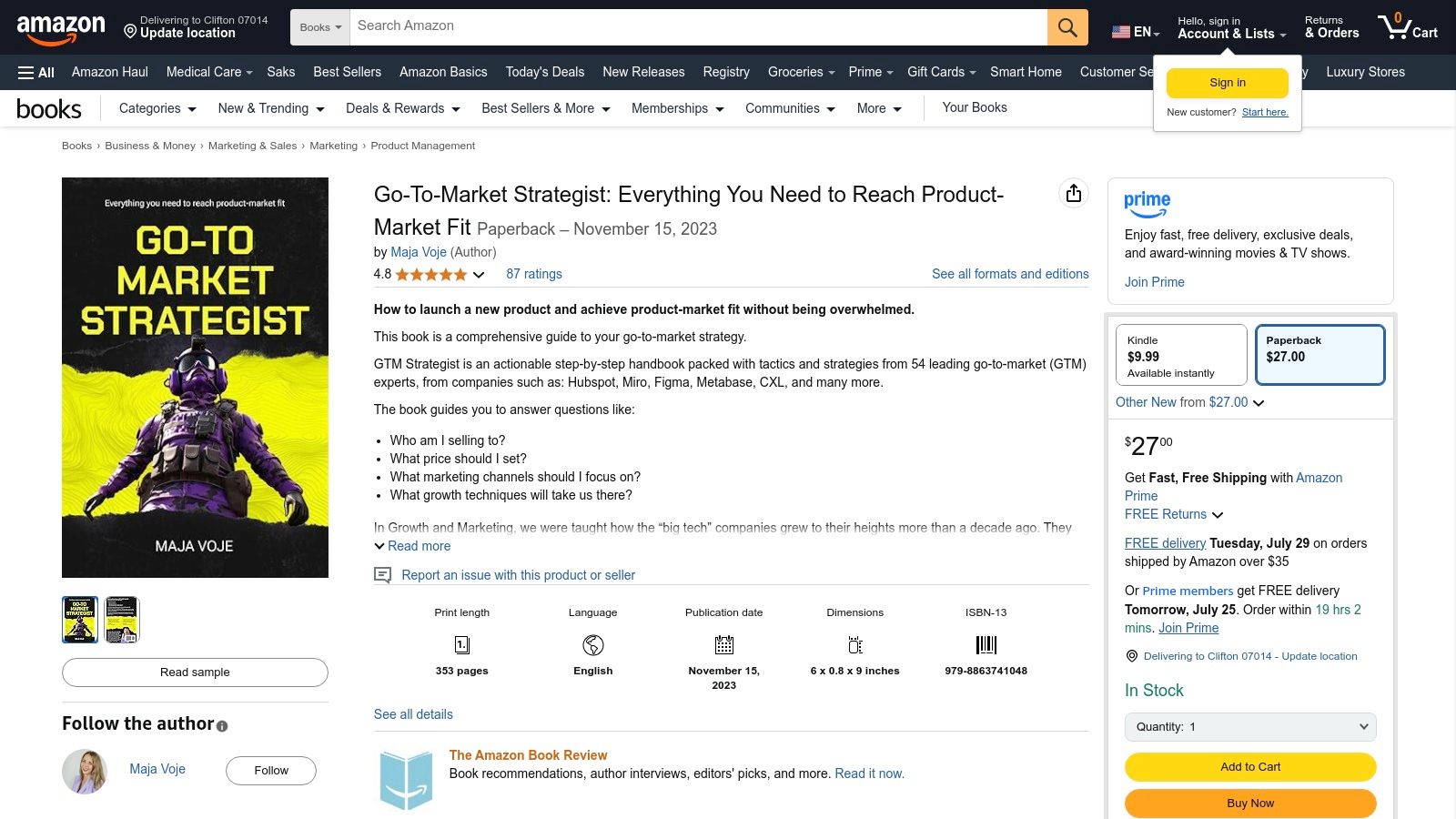
Strategic Analysis
The book's availability on Amazon demonstrates its own product-market fit within the business literature category. By leveraging Amazon's global distribution, the author reaches a massive, self-selecting audience of professionals actively searching for solutions to their business challenges. The high ratings and positive reviews act as social proof, validating its value and helping it stand out among countless other business books.
Its content is particularly effective because it translates complex go-to-market theories into actionable steps. The inclusion of practical templates is a key differentiator, addressing the common pain point of founders who struggle to apply abstract concepts. This aligns well with other practical startup needs, such as creating a compelling narrative for investors; for a deeper look into that process, you can explore these successful startup pitch deck examples.
Key Features & Benefits
| Feature | Benefit |
|---|---|
| Go-To-Market Focus | Provides a specialized, in-depth guide on a crucial aspect of achieving PMF. |
| Practical Templates | Offers ready-to-use frameworks that readers can immediately apply to their business. |
| Real-World Examples | Illustrates concepts with concrete case studies, making them easier to understand. |
| Multiple Formats | Available in both print and digital versions to suit different reading preferences. |
Access and Pricing
- Availability: The book is available globally through Amazon's various regional websites.
- Access: Can be purchased as a physical paperback or a digital Kindle e-book.
- Pricing: The price varies depending on the format (paperback or Kindle) and the Amazon region. It is available as a one-time purchase.
6. Anurag Wadehra's "Product Market Fit Master Class"
For those seeking a deep, expert-led educational experience, Anurag Wadehra's "Product Market Fit Master Class" provides an intensive curriculum designed by a seasoned industry professional. This self-paced course offers over six hours of video content, positioning itself as a premium resource for entrepreneurs who want to move beyond theory and into structured, actionable frameworks. It’s an educational tool focused on teaching the methodologies behind achieving product-market fit.
The course is composed of 80 distinct lessons, guiding learners through a systematic process with project-based worksheets and real-world case studies. This hands-on approach ensures that the concepts aren't just abstract ideas but are grounded in practical application. It meticulously covers everything from identifying underserved customer needs to building a repeatable go-to-market engine.
Strategic Analysis
This master class finds its own product-market fit by targeting a segment of founders and product leaders who are willing to invest in premium, in-depth content from a single, credible expert. Unlike broader platforms with varied instructor quality, this course’s value proposition is built on the authority and singular vision of Anurag Wadehra. It addresses the pain point of information overload by providing one comprehensive, step-by-step system.
The inclusion of project worksheets is a key strategic element, transforming passive learning into an active, project-based experience. This structure is ideal for learners who are concurrently building their own ventures. The content's progression from ideation to scaling also provides a clear roadmap, which is crucial for applying these concepts to a cohesive growth marketing strategy post-PMF. These practical elements are what make it a strong example of a well-targeted educational product.
Key Features & Benefits
| Feature | Benefit |
|---|---|
| Expert-Led Instruction | Gain insights and frameworks directly from an experienced industry professional. |
| Project-Based Learning | Apply concepts immediately with guided worksheets and tutorials. |
| Comprehensive Curriculum | Covers the entire PMF journey across 80 detailed lessons. |
| Lifetime Access | Revisit course materials anytime, ensuring long-term value for a one-time fee. |
Access and Pricing
- Availability: The course is available for purchase and access globally through the Thinkific platform.
- Access: Upon purchase, you receive lifetime access to all course materials, including videos and worksheets.
- Pricing: The course is offered as a one-time purchase of $699, reflecting its premium, comprehensive nature.
Website: anuragwadehra.thinkific.com
7. MentorCruise: Product-Market Fit Training Programs
For businesses and individuals seeking hands-on, personalized guidance, MentorCruise offers a unique approach to mastering product-market fit. Instead of a one-size-fits-all course, the platform connects you with experienced, pre-vetted mentors for one-on-one sessions, workshops, and custom corporate training. This makes it an excellent resource for getting tailored advice specific to your product and industry challenges. It's less about passive learning and more about active problem-solving with an expert.
MentorCruise facilitates direct interaction with industry professionals who have successfully navigated the PMF journey themselves. The platform's flexibility allows you to find a mentor who matches your time zone, budget, and specific learning objectives, from validating an initial idea to scaling a proven product. This direct pipeline to expertise is one of the clearest product market fit examples in the professional development space, connecting ambition with experience.
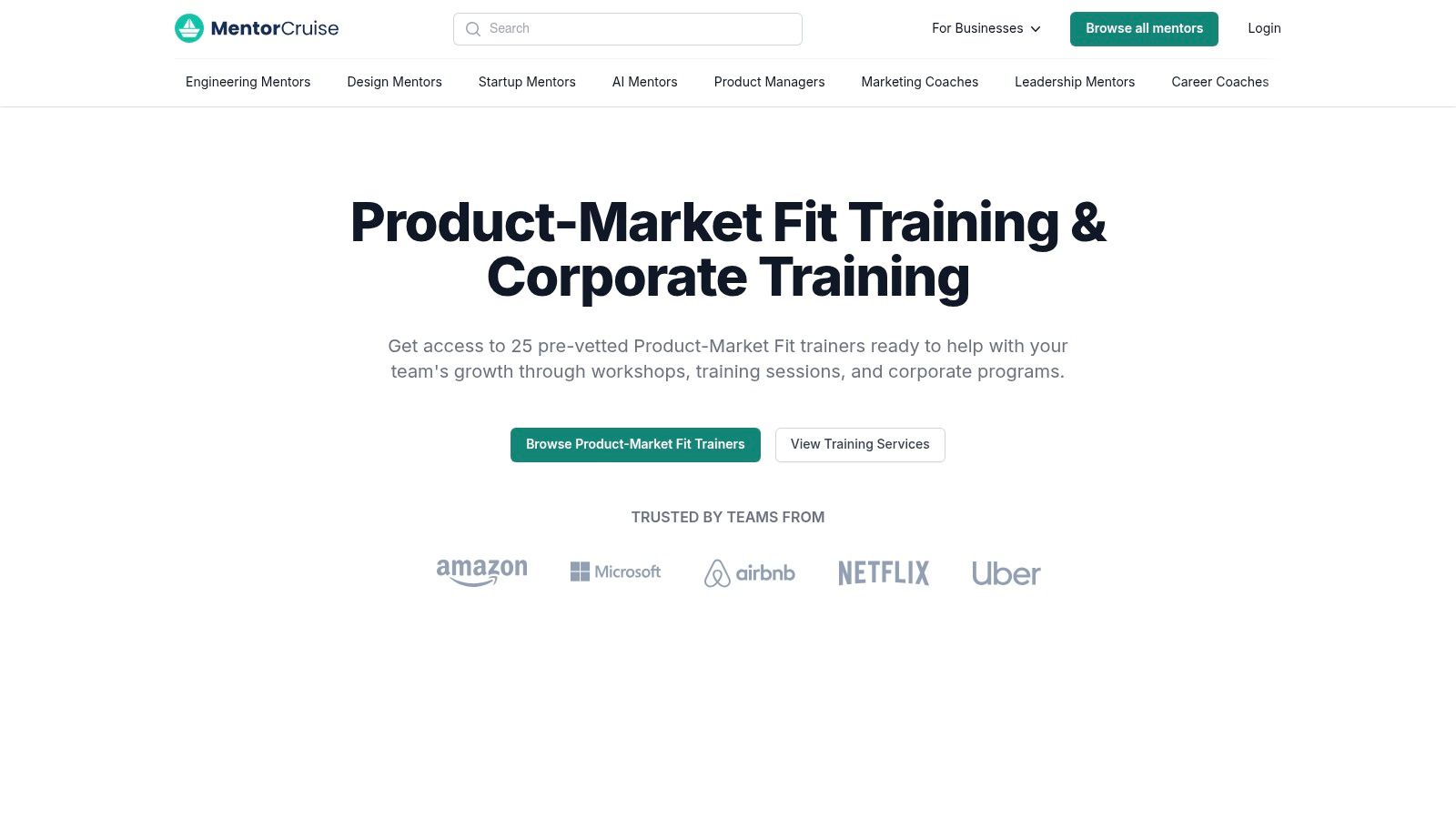
Strategic Analysis
MentorCruise found its own product-market fit by addressing a gap left by traditional courses and broad-based consulting. It targets founders, product managers, and teams who need specific, actionable feedback rather than general theory. The platform's core value proposition is access to curated expertise on demand, which is significantly more cost-effective and flexible than hiring a full-time consultant.
The model is particularly effective for startups and SMBs that need to pivot or validate quickly. A mentor can act as a sounding board for critical decisions, helping to avoid common pitfalls. This is especially useful for those in the service industry, such as freelancers who can apply these principles to better position their offerings. You can find more strategies on how to attract new clients for your services here after refining your market fit.
Key Features & Benefits
| Feature | Benefit |
|---|---|
| Access to Vetted Mentors | Ensures you receive high-quality, relevant advice from proven industry experts. |
| Flexible Training Formats | Choose from one-on-one sessions, workshops, or team training to suit your needs. |
| Personalized Guidance | Get feedback and a strategic roadmap tailored to your specific product and market. |
| Cost-Effective Expertise | Provides access to top-tier talent without the high cost of traditional consulting. |
Access and Pricing
- Availability: Services are available globally through the online platform.
- Access: Users can browse mentors and request sessions directly through the site.
- Pricing: Pricing is variable and depends on the mentor's rates and the chosen program format (e.g., monthly mentorship, session packs). You must inquire for specific program costs.
Website: mentorcruise.com
Product-Market Fit Course Comparison
| Offering | Implementation Complexity 🔄 | Resource Requirements ⚡ | Expected Outcomes 📊 | Ideal Use Cases 💡 | Key Advantages ⭐ |
|---|---|---|---|---|---|
| Creativize | Low – User-friendly platform | Low – Internet access, basic registration | Effective local creative talent discovery | SMBs, startups, marketing agencies seeking local creatives | Verified reviews, detailed portfolios, local focus |
| Coursera: "Establishing Product-Market Fit" Course | Low – Self-paced online course | Low – Time commitment, internet required | Foundational PMF understanding, flexible learning | Beginners seeking product-market fit fundamentals | University-backed, flexible schedule, certificate available |
| Product Manager Courses: "Product Market Fit Bootcamp" | Medium – 8-week structured program | Medium – Time (3h/week), $950 tuition | Actionable PMF plans for B2B tech products | Founders and product leaders in B2B tech | Expert-led, practical workshops, clear schedule |
| Product-Led Alliance: "Product-Market Fit Certified" | Low – Self-paced modules | Low-Medium – Internet access, inquiry for pricing | PMF measurement skills with templates and frameworks | Individuals wanting flexible, expert-led PMF training | Lifetime access, practical templates, certification |
| Amazon: "Go-To-Market Strategist" (Book) | Low – Self-study book | Minimal – Purchase required | Theoretical understanding of GTM strategies | Entrepreneurs and product managers preferring self-study | Practical templates, multiple formats, highly rated |
| Anurag Wadehra's "Product Market Fit Master Class" | Medium – Self-paced video course | Medium – $699 tuition, internet required | Comprehensive PMF knowledge with case studies | Learners wanting in-depth, expert-led video content | Extensive lessons, project-based, lifetime access |
| MentorCruise: Product-Market Fit Training Programs | High – Personalized mentorship | Variable – Cost depends on mentor/program | Customized PMF guidance and team training | Teams or individuals seeking tailored expert support | Flexible formats, expert mentors, adaptable training |
Your Roadmap to Finding Product-Market Fit
The journey to product-market fit is not a straight line; it's a dynamic cycle of listening, iterating, and sometimes, pivoting entirely. As the detailed product-market fit examples in this guide demonstrate, from Coursera's targeted course to the intensive bootcamp from Product Manager Courses, success isn't about having a perfect idea from day one. It’s about a relentless commitment to solving a painful problem for a specific audience.
Across these diverse training programs and resources, a clear pattern emerges. Finding your fit is less about a single "aha!" moment and more about a structured, evidence-based process. This process is built on a foundation of deep customer empathy and a willingness to be proven wrong.
Core Principles for Your PMF Journey
Synthesizing the lessons from these examples, we can identify several universal truths that apply to any venture, whether you're launching a SaaS platform, a freelance service, or a community organization.
- Start with a "Hair on Fire" Problem: The most successful products don't just offer a nice-to-have feature; they solve a significant, urgent pain point. The courses we've examined all stress the importance of identifying and validating this core problem before writing a single line of code or designing a logo.
- Embrace Your Niche: Trying to be everything to everyone is a fast track to being nothing to anyone. Anurag Wadehra's Master Class and the Product-Led Alliance certification both emphasize the power of targeting a small, well-defined market segment first. Deeply understanding their unique needs allows you to build something they truly love.
- Validate Before You Build: The "Go-To-Market Strategist" book and various mentorship programs like those on MentorCruise show that the leanest path to PMF involves testing your assumptions early and often. Use landing pages, surveys, and customer interviews to gather data and validate demand before over-investing in development.
Your Actionable Next Steps
Theory is valuable, but action is what creates momentum. Don't let the quest for perfect product-market fit lead to analysis paralysis. An essential first step in your roadmap is a thorough understanding of your target audience and landscape, which begins with learning how to conduct market research effectively.
Once you have that foundational knowledge, here are three concrete steps you can take this week to move closer to finding your fit:
- Talk to 10 Potential Customers: Reach out to people in your target niche. Don't pitch your solution; instead, listen to their problems, understand their workflow, and ask what they’ve tried in the past.
- Test an Idea with a One-Page MVP: Create a simple landing page that clearly articulates your value proposition for a single customer segment. Drive a small amount of traffic to it and measure interest via email sign-ups.
- Analyze Your Retention Data: If you have an existing product, apply the 40% rule. Survey your users and see if at least 40% would be "very disappointed" if they could no longer use your product. This is a powerful indicator of PMF.
Finding product-market fit is the critical milestone that separates struggling ventures from scalable businesses. It’s the moment your product starts to pull customers in, creating a self-sustaining loop of growth. Use the strategies from these product-market fit examples not as a rigid formula, but as a flexible roadmap to guide your unique journey.
Once you've found your product-market fit, scaling your message becomes the next critical challenge. Creativize connects you with a global network of vetted creative freelancers who can help you build a brand and create marketing assets that resonate with your newly validated audience. From logo design to video ads, find the talent you need to capitalize on your momentum at Creativize.

